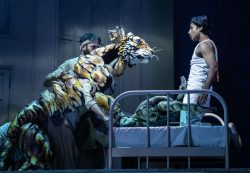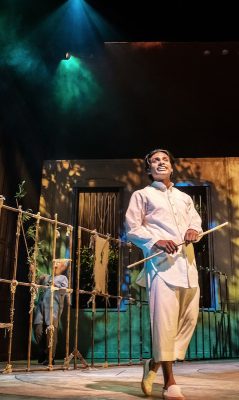 WHILE Captain Macheath in The Beggars Opera was none too pleased to have to make a choice between his two lovers, Polly Peacham and Lucy Lockit – ‘ How happy could I be with either, were t’other dear charmer away’ – the audience in the Bristol Hippodrome for the press night performance of Life of Pi were only too happy to have a choice of the two actors playing the role of Pi.
WHILE Captain Macheath in The Beggars Opera was none too pleased to have to make a choice between his two lovers, Polly Peacham and Lucy Lockit – ‘ How happy could I be with either, were t’other dear charmer away’ – the audience in the Bristol Hippodrome for the press night performance of Life of Pi were only too happy to have a choice of the two actors playing the role of Pi.
Up to the interval, Divesh Subaskaran, making his debut as a professional actor, was doing a splendid job of conveying the complex character of this 17-year-old Indian boy re-living the harrowing experience of being the only survivor of a shipwreck, spending 227 days in an open boat. When the audience returned after the break, they were greeted with the information that Divesh was unable to continue in the role, and would they please give the company a little while to rearrange things allowing the understudy, Keshini Misha, to take over the role of Pi.
With typical British patience the audience talked amongst themselves for 15 minuets before Keshini took over, bringing the same passion and commitment to the role as Divesh had done in Act 1.
The one big difference was that Pi had now metamorphosed from a boy to a girl, and, remarkably this change of gender did not appear to throw the actor off balance in any way, or upset the audiences’ acceptance of this powerful story.
 It is a tale full of allegories, with human characters and animals brought to life by a series of wonderfully made and manipulated full-size puppets, taking on each others’ personalities. Is the Bengal Tiger with whom Pi shares his 227 days at sea real or an imagined extension of himself? Is the gentle doomed Zebra real, or the spirit of his beloved mother Amma (Goldy Notay)? Or is the vicious Hyena really the unfeeling ship’s cook (Anthony Antunes)?
It is a tale full of allegories, with human characters and animals brought to life by a series of wonderfully made and manipulated full-size puppets, taking on each others’ personalities. Is the Bengal Tiger with whom Pi shares his 227 days at sea real or an imagined extension of himself? Is the gentle doomed Zebra real, or the spirit of his beloved mother Amma (Goldy Notay)? Or is the vicious Hyena really the unfeeling ship’s cook (Anthony Antunes)?
We are introduced to these and many more humans and animals as, now safe in a Canadian hospital, Pi tells the story of the journey from a riot-torn India in a leaky transport ship with his family and animals from his father’s Indian Zoo, en route for Canada. The storm that wrecks the ship and the horrendous goings on in the open boat, as the pacifist vegetarian watches the original survivors, a zebra, orang-utan, hyena and Bengal tiger, one by one obeying the laws of the jungle, the survival of the fittest, are vividly conveyed by a mixture of excellent sound and lighting effects.
 In the end, against all his/her principles and beliefs, here is someone who in the same day attends a temple, church and mosque – Why not? They are all the same God aren’t they, under a different guise? – they tame the tiger and kill a passing turtle in order that they both can survive. The cynical Japanese investigator (Lilian Tsang) and sympathetic Canadian welfare worker, to whom Pi tells the story, cannot believe Pi’s account of the shipwreck and journey, alone in an open boat with a Bengal tiger, and so the story is retold with humans replacing the original animals. As the roles are reversed, it underlines the authors’ belief that humans and their society are far more vicious and ruthless than the animal kingdom, who only kill to survive, never just for personal gain or power over others.
In the end, against all his/her principles and beliefs, here is someone who in the same day attends a temple, church and mosque – Why not? They are all the same God aren’t they, under a different guise? – they tame the tiger and kill a passing turtle in order that they both can survive. The cynical Japanese investigator (Lilian Tsang) and sympathetic Canadian welfare worker, to whom Pi tells the story, cannot believe Pi’s account of the shipwreck and journey, alone in an open boat with a Bengal tiger, and so the story is retold with humans replacing the original animals. As the roles are reversed, it underlines the authors’ belief that humans and their society are far more vicious and ruthless than the animal kingdom, who only kill to survive, never just for personal gain or power over others.
You can just enjoy the excitement that this spectacularly presented show offers, but acted and directed with a deep sense of commitment and belief, this is a production that sets out, and in so many ways, succeeds, in inviting its audience to take a new much closer look at their own desires and beliefs.
GRP
The Life of Pi tour also stops at Plymouth Theatre Royal from 5th to 9th March, Southampton Mayflower from 14th to 18 May, Bath Theatre Royal from 22nd to 25th May and at Truro’s Hall for Cornwall from 28th May to 1st June.
Photographs by Johan Persson